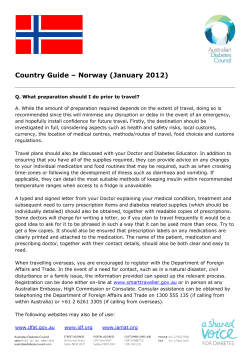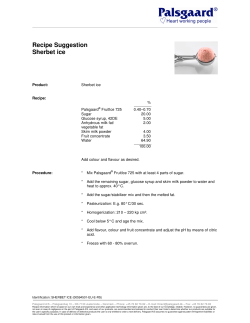
r e s e a r c h
research information Chromium and Vanadium Provides support for healthy glucose metabolism What trace minerals can help us balance wayward blood sugar levels? Studies on chromium GTF and vanadium have proved so promising that Natural Factors has combined these nutrient into one convenient nutritional supplement. So what does the research show and how can we benefit if our blood sugar levels tend to rise and fall capriciously? Chromium is a component of a molecule called Glucose Tolerance Factor that regulates blood sugar levels, making it beneficial for both high and low blood sugar problems. The hormone insulin will not work without chromium. As a “master hormone” insulin regulates much more than blood sugar levels – it also controls fat, protein and energy metabolism, so any insulin imbalance can have far-reaching negative health effects. Many studies show that low levels of chromium are directly linked to blood sugar imbalances whereas adequate levels of chromium may improve insulin sensitivity and balance blood sugar levels. This was first discovered when patients who could not take food in by mouth were fed directly by a feeding solution into the veins, called Total Parenteral Nutrition or TPN. These feeding solutions contained everything needed for optimal nutrition, except chromium. After several months, TPN patients developed high blood sugars as if they were diabetic. Even when doctors started insulin therapy with these patients the insulin didn’t work that well. The missing link was chromium. Less than 50 micrograms of chromium was added to their IV’s and improvement came quickly. Now chromium is considered an essential trace element and is recommended at dosages of 50-200 mcg per day. When we get enough chromium our sensitivity to insulin is improved, blood sugar levels may become normalized whereas insufficient chromium may be responsible for hyperglycemia, hypoglycemia, glycosuria and insulin resistance. Chromium does not stimulate the body to make more insulin, rather it makes insulin that is already present work more effectively. Out of 16 well-designed studies on the effect of chromium supplementation on diabetics, 13 studies showed blood glucose improvement with chromium supplementation. “Chromium in the form of the GTF is released into the blood... whenever there is a marked increase in the blood levels of sugar (glucose) and/or of insulin. Hence, the GTF might be considered to behave like a hormone. It, along with insulin, acts in making it easier for amino acids, fatty acids, and sugars to pass from the blood into the cells of various tissues. It also promotes the metabolism of the nutrients within the cells. Much more insulin is required when GTF is lacking.” (Ensmigner) What is vanadium and how does it work? People are becoming more familiar with vanadium, an ultra-trace mineral that is found in our body and in a variety of foods. Vanadium seems to help improve blood sugar levels and insulin resistance, a persistent health problem that affects many people. Often as people age, their cell receptors sites are not as responsive to their own production of insulin, causing a dangerous rise in blood sugar. This “insulin resistance” is contrasted with Type I diabetes which is caused by the inability to produce enough insulin. Vanadium and its effect on blood glucose levels has been studied off and on for about 100 years. With the advent of insulin the interest in vanadium faded but was reignited in 1985 when a group of researchers studied the effect of vanadium on diabetic rats. Supplemental vanadium brought their blood glucose to normal. Although there are few studies on vanadium, the results so far are very promising. Studies show that vanadium may improve glucose tolerance in persons with non-insulin-dependent diabetes mellitus (NIDDM). In animal studies, supplemental vanadium also helped to normalize blood sugar levels. The studies used vanadyl sulfate (VS), a form of vanadium. Eight patients with Type II diabetes or NIDDM were given 50 mg vanadyl sulfate twice daily for four weeks in this single-blind, placebo-controlled study. After a four-week placebo phase, the results were tallied. “VS administration was associated with a 20% decrease in fasting glucose concentration and a decrease in hepatic glucose output (HGO) during hyperinsulinemia. The improvement in fasting plasma glucose and HGO that occurred during vanadyl sulfate treatment was maintained during the placebo phase... We conclude that vanadyl sulfate at the dose used was well-tolerated and resulted in modest reductions of fasting plasma glucose and hepatic insulin resistance.” (Boden) Chromium and vanadium – Are they safe? Here is what the Food & Nutrition Encyclopedia states about chromium safety, “there is a wide range of safety between the helpful and the harmful doses of chromium (the toxic This information is provided for educational purposes only, and is not intended for self-diagnosis or self-treatment of conditions that should be assessed and treated by your health care practitioner. While the information contained in this document has been carefully reviewed and reflects current clinical and scientific knowledge, it is subject to change. © All rights reserved – Natural Factors Nutritional Products Ltd. • Enquiries: custservice@naturalfactors.com • 27833 • July 6, 2009 • Pg 1 of 2 Where Great Health Begins research information Chromium and Vanadium dose is about 10,000 times the lowest effective medicinal dose). (Ensminger) However, the editors caution that diabetics who take insulin injections and decide to add supplemental chromium GTF to their diet should be aware that their blood sugar levels may drop too low because of chromium GTF’s insulin-enhancing effect. At Natural Factors we strongly advise anyone with diabetes to monitor their blood sugar levels closely under the care of their health care practitioner. Vanadium is safe and well-tolerated when label directions are followed. The human studies on vanadium used high doses (as much a 100 milligrams per day) and no toxicity was observed. Natural Factors contains 25 micrograms of elemental vanadium per capsule, well below the high doses used in the studies. Although vanadium is rapidly absorbed, what is not used is quickly excreted. When taken according to label directions, vanadium citrate and chromium HVP chelate are very safe. However, additional chromium and vanadium in the diet may affect insulin requirements, so it is recommended that persons who have blood sugar imbalances such as diabetes should always use these minerals under the supervision of a health care practitioner if on diabetes or blood sugar medications. Persons taking medications such as lithium for manic depression should consult their health care practitioner before supplementing with vanadium. Key References Boden G., et al., “Effects of vanadyl sulfate on carbohydrate and lipid metabolism in patients with non-insulin-dependent diabetes mellitus,” Metabolism, 45 (9): 1130-5; Sept 1996 Ensminger, Ensminger, et al., (eds) “Foods & Nutrition Encylopedia,” 2nd ed, vol 1 p 418; 1993 This information is provided for educational purposes only, and is not intended for self-diagnosis or self-treatment of conditions that should be assessed and treated by your health care practitioner. While the information contained in this document has been carefully reviewed and reflects current clinical and scientific knowledge, it is subject to change. © All rights reserved – Natural Factors Nutritional Products Ltd. • Enquiries: custservice@naturalfactors.com • 27833 • July 6, 2009 • Pg 2 of 2 Where Great Health Begins
© Copyright 2025
















